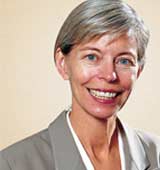|
Executive Interviews: Interview with Jeanne M Brett on Multicultural Teams
March 2007
-
By Dr. Nagendra V Chowdary
 Jeanne M Brett
Jeanne M Brett
DeWitt W Buchanan, Jr., Professor of Dispute Resolution and Organizations at Kellogg School of Management, Northwestern University 
Congratulations Prof. Jeanne Brett
and your two colleagues for scripting
a thoroughly researched and powerful
article on managing multicultural
teams. It's timely and highly relevant.
What has been the trigger for
embarking on this research?
Multicultural teams have become the
reality rather than the exception in an
increasingly globalized business
world; yet our knowledge of what
makes these teams effective has not
kept pace with their popularity.
-
How do you define multicultural
teams? Is it to do with nationalities
alone? What are the defining
characteristics of multicultural teams?
|
|
We define multicultural teams as
groups of people from 2 or more
different nationalities working
together face to face at least 2-3 times a
year to run a business, produce a
product of service, solve a problem,
make a decision. Multicultural teams
can be short-term team, that is, a team
convened for a specific project, e.g.,
set up a joint venture, evaluate a new
market; or long-term team, that is, a
permanent team (members may rotate
out), e.g., running a business or area of
business. Multicultural teams may
also be multifunctional in terms of
members' backgrounds and
responsibilities. -
In the increasing pace and reach of
globalization (of markets and
resources) and mobility no longer an
impediment, do you think
multicultural teams are to be viewed
as an absolute necessity or are they
avoidable phenomena?
Even when a company's business is
entirely domestic, that company is
likely to have a multicultural
workforce for two reasons. First,
national populations are being
coming more and more multicultural.
Second, students attending the best
universities in the world are from all
over the globe. To hire the best
managers and engineers, even a
company with a totally domestic
focus will have a multicultural
workforce. -
If you have to rate the necessity for
multicultural teams for various
industries, in which industries do you
think multicultural teams would be
absolute necessity? (Out of Fortune's 49
industry categories or US's Standard
Industry Classification).
This is not a topic of our research -
Your article begins with an
illustrative example of a taskdisorientation
between American and
Indian team members arising primarily
out of cultural differences. Isn't it
reasonable to expect that cultural
differences are bound to exist when
team members assembled are from two
different cultures? (However, different
team priorities cannot coexist).
One of the messages of our article is
that team members have to create
team processes that allow for cultural
coexistence. Your question implies
that you are also asking whether team
members' differential priorities can
also coexist. The answer to that
question is of course and anyone on a
culturally homogenous but
functionally heterogeneous team
recognizes that teams negotiate both
processes and outcomes that
recognize and respect functional
differences. -
Should cultural diversity, therefore,
be looked at as an advantage or a
disadvantage? When does it become
an advantage and when does it
become a disadvantage?
Cultural diversity should be an
advantage if the team's task affects
more than one country, the team is
expected to achieve innovative
outcomes that will serve a globally
fragmented customer base, or solve
problems in multiple geographical
areas simultaneously. Research
indicates that teams have to engage in
processes that unleash the diverse and
creative ideas of their members if they
are to be successful in generating
creative solutions to such problems.
1.
Team Building Case Study
2. ICMR
Case Collection
3.
Case Study Volumes
|
